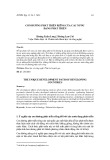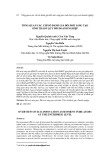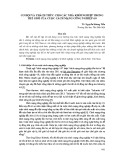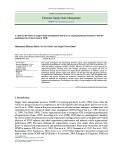
http://www.iaeme.com/IJMET/index.asp 706 editor@iaeme.com
International Journal of Mechanical Engineering and Technology (IJMET)
Volume 10, Issue 03, March 2019, pp. 706-717. Article ID: IJMET_10_03_074
Available online at http://www.iaeme.com/ijmet/issues.asp?JType=IJMET&VType=10&IType=3
ISSN Print: 0976-6340 and ISSN Online: 0976-6359
© IAEME Publication Scopus Indexed
EMPOWERING ORGANISATIONAL
KNOWLEDGE CREATION AND
PERFORMANCE: A MODERATING FOCUS ON
DYNAMIC CAPABILITY OF PROFESSIONAL
AND TECHNOLOGY-DRIVEN FIRMS
ATOLAGBE, T. M, WORLU, R. E. K, ADENIJI, A. A and SALAU, O. P.
Department of Business Management,
Covenant University, Ota, Ogun state, Nigeria
ABSTRACT
This paper examined the role of dynamic capability as a moderator in explaining
knowledge creation processes and performance of Professional and Technology-
Driven Firms. The role of four ontological dimensions (socialization, externalization,
combination and internalization) of knowledge creation in a spiral model were
explored. A total of 424 out of 450 members of the sampled firms participated,
representing 94% response rate. The information was acquired through the use of an
organized questionnaire while the participant targets include managers,
administrators, supervisors, and other classes of employees who were entreated to
honestly answer items in the questionnaire. The study evaluated construct test validity
(measurement) and structural model to establish the factor structure and degree of
relationship of a number of observed variables. Our results indicate that ability to
creatively combine resources and competencies has significantly helped sampled firms
to create new knowledge and improving such knowledge in offering greater value to
satisfy customers’ requirements and enhance performance outcomes.
Keywords: Knowledge, Knowledge creation, Dynamic capability, Technology,
Innovation, Performance.
Cite this Article: ATOLAGBE, T. M, WORLU, R. E. K, ADENIJI, A. A and
SALAU, O. P, Empowering Organisational Knowledge Creation and Performance: A
Moderating Focus on Dynamic Capability of Professional and Technology-Driven
Firms, International Journal of Mechanical Engineering and Technology, 10(3), 2019,
pp. 706-717.
http://www.iaeme.com/IJMET/issues.asp?JType=IJMET&VType=10&IType=3

ATOLAGBE, T. M, WORLU, R. E. K, ADENIJI, A. A and SALAU, O. P
http://www.iaeme.com/IJMET/index.asp 707 editor@iaeme.com
1. INTRODUCTION
Knowledge is presently recognized as the best form of information which should be created
and managed appropriately in gaining competitive advantage. Knowledge plays a substantial
role in society, and the optimal use of knowledgeable and well-informed staff is the utmost
critical asset for improving organisational actions. Nonaka and Ichijo (2007) advocated that
the process of improving organisational actions centre on organisation’s unique ability to
create new knowledge, utilize its resources and predominant application in offering greater
value to satisfy the needs and requirements of the customers. Knowledge creation, according
to Nonaka, and Ichijo (2007) is the heart of organisation’s competitive advantage and it
focuses on the ability to continuously transfer, combine and convert different kinds of
knowledge (tacit and explicit knowledge) in enhancing organisational performance.
Knowledge creation is also the act of translating new ideas into innovative product and
services to achieve competitive advantage.
The importance of knowledge and innovation in modern economic justifies the increasing
interest that scholars are taking in studying professional and technology-driven firms. The
dynamism of business environments is at an accelerating rate, causing an increasing level of
uncertainty to organizations especially in Nigeria. Even though there are initiatives for an
increase in the process of creating new insight/idea, several firms in developing countries like
Nigeria seem to get lost in their focus on knowledge creation. As a contradiction to the recent
trends, there are indeed several businesses focusing on creating profit, rather than creating
knowledge and improving the ability to combine resources and competencies for performance
effectiveness. These challenges have eroded the value of existing firm competences,
encouraging firms to create knowledge and building strategic competences that will help to
survive in a dynamic environment (Yeung, 2016, Childe, 2014). Extant literature has
identified direct connection between knowledge creation and performance; while others
argued that the relationship can be influenced by some factors. Other studies have shown that
the most pressing obstacle influencing the role of knowledge creation on performance is
firm’s ability to respond and reintegrate internal and external capabilities to address swiftly
changing environments.
Dynamic environments encourage the firm to respond to the changes in the environment
by sensing, reallocating, reconfiguring and renewing the existing capabilities. Hence, dynamic
capabilities are a core element for every nation to survive in today’s dynamic environment. In
the last decade, a number of researchers have considered the concept of dynamic capacities as
the heart of strategy and the methodology of the firm, firm’s competitive advantage and the
value creation. Dynamic capabilities are expected to be valuable for organizations dealing
with business turbulence, and early identification of threats or opportunities creates better
opportunities for many organisations in the developed and developing countries. The
dynamism of business environments is at an accelerating rate, causing an increasing level of
uncertainty to organizations especially in Nigeria.
Dynamic capabilities strategy explains how the manufacturing sector especially the
manufacturing firms in Nigeria adapts to changes in their business environments and at the
same time achieving sustainable competitive advantage. Also manufacturing firms in Nigeria
are becoming increasingly aware of the threats and the opportunities that ICT presents
(Safeena, Abdullah and Date, 2010) and these are continually transforming the traditional way
of providing continued services and providing competitive edge that provide those electronic
services. Changes emerging from business environments may cause an organization’s
capabilities to become less valuable or even redundant. The Nigerian professional and
technology-based firms are characterized by increased environmental dynamism brought
about by rapid technological development, customer sophistication and regulations. Hence,

Empowering Organisational Knowledge Creation and Performance: A Moderating Focus on
Dynamic Capability of Professional and Technology-Driven Firms
http://www.iaeme.com/IJMET/index.asp 708 editor@iaeme.com
the business environment of the manufacturing firms in Nigeria is expected to remain very
dynamic (Adesina &Ayo, 2010).
In Nigeria, the issue of dynamic capabilities cannot be separated from the social and
environmental concern in the country. According to Oguntade and Mafimisebi (2011),
organizations operating in Nigeria have not done enough to improve their performance
despite the huge amount of profits they are realizing. In Nigeria, due to the existing
competitive work milieu characterized by high uncertainty and intense global competition,
knowledge has been seen as one the greatest intangible assets in the professional and
technology-driven firms. The professional and technology-driven firms are often faced with
the most uncertain environment and increasing pressure from various constituencies to remain
in market.
The expectation in responding to environmental change has become very high in Nigeria
especially among professional and technology-based firms in Nigeria and the negligence of
the expectations by those companies has resulted to a very turbulent environment for them
(Onwuchekwa, 2002). However, the practices of dynamic capabilities have been absent
among professional and technology-based in Nigeria which scholars and authors has failed to
address as this has breed negative perception and attitudes among consumers, communities’
dwellers and other stakeholders towards these concerns, thus, connotes a bad organizational
image building strategy. As a result of this, this study largely focused on moderating role of
dynamic capability on knowledge creation and performance of professional and technology-
driven firms.
2. LITERATURE REVIEW
2.1. Organisational Knowledge
Knowledge is presently recognized as critical success factor which should be managed
appropriately in achieving distinctive advantage. Knowledge can be defined as the act of
knowing (with absolute certainty) through experience or education. Knowledge is an
intangible asset in human beings and held in high esteem. This knowledge can be
conceptualized as the capability of the firm to detect new opportunities, scan environment,
answer to competitive planned moves and evaluates the competitive position. Nonaka and
Takeuchi (1995) developed a knowledge-based theory to examine how knowledge can be
created and managed within an organization.
2.2. Knowledge Creation
Knowledge creation is the act of translating new ideas into innovative product and services in
order to achieve competitive advantage. Nonaka’s contribution to knowledge creation theory
development integrates the knowledge creation process of socialization, externalization,
combination and internationalization (SECI) coupled with the concept of ‘Ba’ (the
environment where the idea/knowledge is generated), and enabling capabilities (leadership,
organizational culture, learning). Consequently, knowledge creation represents the process of
enabling people to create new insights and ideas into innovative product and services as
presented in Table 1.

ATOLAGBE, T. M, WORLU, R. E. K, ADENIJI, A. A and SALAU, O. P
http://www.iaeme.com/IJMET/index.asp 709 editor@iaeme.com
Table 1 Operational Terms
S/N
Organisational Knowledge Creation defined
Authors
1
…translating ongoing experiences into knowledge
Dixon (2000)
2
…the act of translating new ideas into innovative product and services that
meets stakeholders’ expectations.
Nonaka and Ichijo
(2007)
3
…is a product of the interplay between knowledge and knowing.
Wellman (2009)
4
…is the process of development of new knowledge.
Dynamic Capabilities defined
5
…capability of sensing opportunities, which is the organization’s ability to
direct operational changes and sense new opportunities.
Teece (2007);
Dannells (2002).
6
…capability of seizing opportunities, which is the firm’s ability to create
and provide structures that improve creativity and innovation.
7
…capability of implementing innovations, which is the firm’s ability to
manage innovation and projects implementation.
8
…capability of reconfiguration, which is the organization’s ability to
readjust available resources.
Firm Performance
9
…a subset of organizational effectiveness that covers operational and
financial outcomes.
Gordonet, et al., (2008);
Kunc and Bhandari,
(2011); Pertusa-Ortega,
et al., (2010).
2.3. Organisational Knowledge Creation and Performance
In the twenty first century, to compete effectively, there is need for organisations to know
about the environmental changes within and outside the organisation and must be at the fore-
front of creating and managing this knowledge. To achieve this, its importance for both staff
/employees of the firm to be fully involved in creating knowledge. Knowledge creation is not
only learnt from others or obtained from outside but knowledge can also be built from
communicating and interacting with individuals within the organisation. Nonaka (2014) and
Ngulube (2003) breaks knowledge creation (KC) into four modes: socialisation (tacit to tacit
knowledge), externalisation (tacit to explicit knowledge), combination (explicit to explicit
knowledge), and internalisation (explicit to tacit knowledge). These specialised modes of
organisational knowledge continuously is needed to transform data into information and
endow it with relevance through the tacit and explicit knowledge (Hamzah, Mahmood &
Khaled, 2013) as displayed in Figure 1.

Empowering Organisational Knowledge Creation and Performance: A Moderating Focus on
Dynamic Capability of Professional and Technology-Driven Firms
http://www.iaeme.com/IJMET/index.asp 710 editor@iaeme.com
Socialization is tacit to tacit knowledge transfer and it can be physical or experiences
shared like brainstorming, information sharing, but sometimes may be difficult to
formalize and interpret (Nonaka & Takeuchi, 2004). This knowledge fosters the need
for openness and further promotes cross fertilization and improvement of ideas.
Externalization is tacit to explicit knowledge. It focuses on the ability to explain an
individual’s ideas to others in such a way that they will understand thereby, becoming
the basis of new knowledge (Nonaka & Takeuchi, 2004).
Combination is explicit to explicit knowledge collected within and outside the
organisation, combined, processed to transform into new knowledge which is shared
among members in the organisation (Nonaka & Takeuchi, 2004).
Internalization is explicit to tacit knowledge where individual continually reflect, see
connections and recognize patterns and capacity to make sense between ideas, and
concepts.
By implications, the professional and technology-based firms have become highly
competitive and are constantly changing from simple to complex and from tame to hostile,
and as a result, the need to be customer-centric and innovative becomes inevitable for
sustaining performance. Presently, innovative performance is a crucial factor in determining
competitiveness and the survival of firm. In relevance to how organisational knowledge
creation enhance innovation performance, literatures have shown that knowledge creation
enhances organisational performance. For instance, studies and theories suggest that
knowledge creation enables firms to innovate (Jin, et al., 2015; Nonaka, 1994). Yang (2010)
found significant support for the relationship between knowledge creation and organizational
effectiveness of a firm. Researchers in various countries focused mostly on the aspect of
organizational effectiveness rather than on organisational performance. As far the research in
the area of knowledge management is concerned, scholars have also focused on pivotal role
played by knowledge creation in enhancing organisational outcomes.










![Chiến lược cách mạng hóa công nghiệp [mới nhất]](https://cdn.tailieu.vn/images/document/thumbnail/2013/20130722/banhbeonhantom/135x160/1523609_066.jpg)















